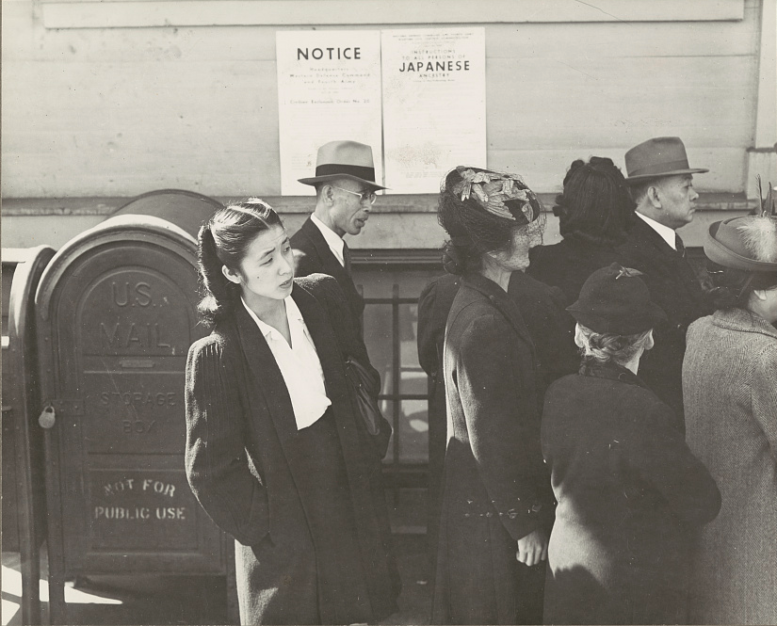This February 19 is the National Day of Remembrance to honor Japanese Americans who were unjustly incarcerated during World War II. Yet how many Ohioans understand its significance in history? Knowing about Japanese American interment offers an important lesson on the meanings of loyalty in troubled times when war and economic insecurity threaten our way of life.
On this date in 1942, President Franklin Delano Roosevelt signed Executive Order 9066, authorizing the forced removal of all people of Japanese descent from California, Oregon, and Washington state, against the recommendations of his own Attorney General, FBI, and Office of Naval Intelligence1. As a consequence, nearly 120,000 people were forced to leave their homes and businesses to move to hastily-built “relocation camps” in the deserts and swamps of the US interior. Despite the euphemism, these camps were prisons, surrounded by barbed wire and patrolled by armed guards.
None of those placed into these camps were accused of any crimes against the government, and all were deprived of their constitutional right to due process. Who were these people? They were ordinary Americans, hoping to create better lives for their families with each generation. Almost two-thirds were US citizens by birth, and one-third were legal immigrants who were barred from becoming naturalized citizens due to anti-Asian immigration laws passed in prior decades.
According to data from the US War Relocation Authority, about a third were under 18 years old, including orphaned children. All were imprisoned without trial and without legal representation, presumed to be disloyal, untrustworthy – in short, the enemy.
While German and Italian Americans’ loyalty was judged individually, based on actions, Japanese Americans were deemed disloyal as a group, solely on the basis of race.
But loyalty is not defined by the way one looks or the language one speaks – in despite the rhetoric of certain politicians past and present who demonize entire nations, races, and/or religions. And one way to ensure we don’t repeat the past is to understand it, and to remember the many ways that Japanese Americans served their country.
For example, thousands of Japanese Americans served in the US military, including in the Military Intelligence Service and in the 442nd Regimental Combat Team, which became the most decorated unit in U.S. military history based on size and length of service.
Others fought for “liberty and justice for all” by waging battles in court. Mitsuye Endo, Gordon Hirabayashi , Fred Korematsu , and Minoru Yasui each filed important lawsuits protesting the unconstitutionality of wartime incarceration. Through their efforts, they sought to ensure that minoritized groups would not be targeted on the basis of race.
Thousands of others honored American principles through civil disobedience. Some refused to register for the draft while being treated as prisoners. Others requested expatriation to Japan and/or accepted the US government’s unprecedented offer to renounce their US citizenship since it had proved meaningless2.
In different ways, all these resisters were demanding that the United States live up to its own principles and follow its own laws.
For too long, these stories have been overlooked. But refusal and resistance are also part of a deeply American tradition of civil disobedience starting with the American Revolution and leading through Dr. Martin Luther King, Jr., who wrote in “Letter from Birmingham Jail” that “One has not only a legal but a moral responsibility to obey just laws. Conversely, one has a moral responsibility to disobey unjust laws.”
No doubt some will say that in times of war, it’s necessary to suspend the rule of law, that extreme times call for extreme measures. But these clichés are the language of justification, to further eroding our most cherished values. As FDR himself said in his 1933 inaugural address, when the nation suffered in the depths of the Great Depression, “the only thing we have to fear is fear itself—nameless, unreasoning, unjustified terror which paralyses needed efforts to convert retreat into advance.” Fear causes people to seek convenient scapegoats in vulnerable Others – often racial, ethnic, or religious minorities. Fear prevents us from developing creative solutions to difficult challenges through collaboration and cooperation.
On this National Day of Remembrance, I ask you to remember Executive Order 9066 and the rights that Japanese Americans fought for. Let us honor them by resisting fear and demagoguery wherever and whenever it’s happening.
Jolie A. Sheffer is a professor of English and American Culture Studies at Bowling Green State University.
1 https://encyclopedia.densho.org/Coram_nobis_cases/#Footnotes

